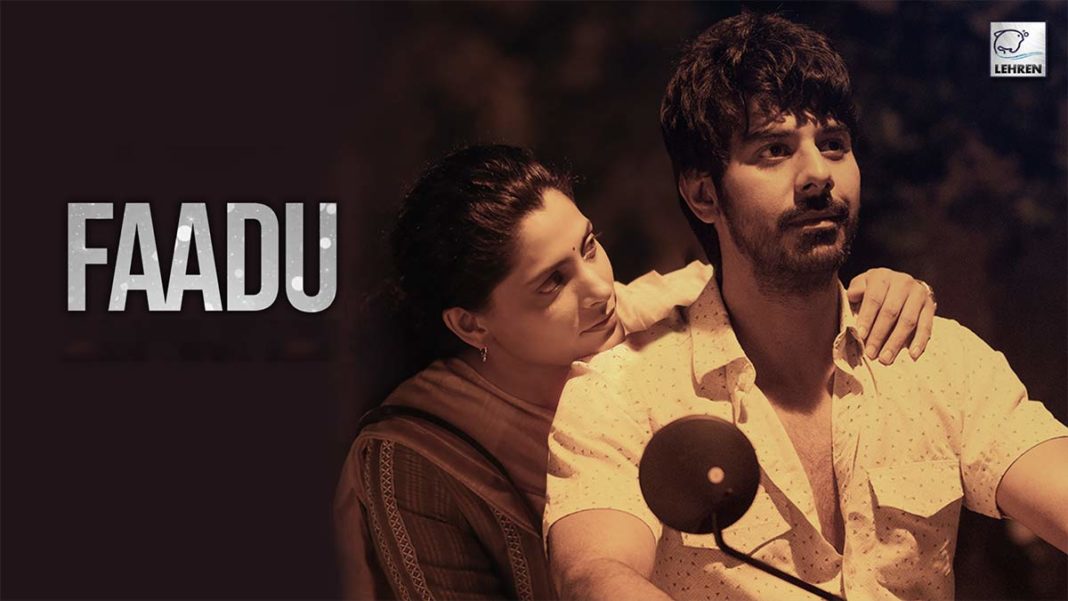It’s like director Ashwiny Iyer Tiwari and writer Saumya Joshi have turned schoolteachers and want you to open your poetry book.
From Faiz Ahmed Faiz and Anand Bakshi to Sylvia Plath, Ashwiny quotes them all to support Manjari (Saiyami Kher) who sees poetry in everything around her with a postman-father encouraging her all the way. You learn without delay that they’re all pure simple souls in the village, her father the kind who helps people around him and says, ‘Uski adhuri kavita ko main poora kar raha hoon’.
When Manjari, a topper, shifts to big bad but beautiful Mumbai to study literature and hears classmate Abhay Dubey (Pavail Gulati) describe his poverty to the professor, she sees poetry in his stinky slum dwelling and in the bedsores of his ailing mother. She has a fixed smile on her face to convey that she’s fallen in love. What do we call this? Poverty poetry?
Abhay, also a topper, is a man in a hurry to clamber out of deprivation and disease, pointing to the swank hospital where he believes his mother should’ve been treated. Ashwiny and cinematographer Navagat Prakash film neat sequences like a carrom game that Abhay knows for sure he’ll win to make money. Brimming over with self-confidence, Abhay promises himself that he’ll soon own the plushest of apartments.
In detailed letters to her father and confidante, Manjari tells it all. Abhay has Roxy (Abhilash Thapliyal), an alcoholic older brother, and Manjari’s fixed smile continues to have nary a complaint over any of it. Not even when Abhay decides to gamble his father’s autorickshaw and tiny little hovel. In fact, she stands by him. There are accompanying scenes that compare a marriage to Abhay’s gambling.
In most cliches, there’s a whore with a golden heart. Saumya and Ashwiny opt for Ratanbhau (Gunjan Joshi), a gangster who cares. Ratanbhau imparts an important lesson to Abhay on the pitfalls that await the overconfident. ‘Galat gali mein pair mat rakhna.’
The Ratanbhau track actually contributes nothing to the story of Manjari and Abhay or his overvaulting ambition. But it’s a tour de force of the world of gangsters and soft porn movies although Ashwiny does not make it sleazy. And except for the usual sprinkle of the chu…word and motherf…., it is a clean watch.
All along, you’re reminded that Manjari loves Abhay just the way he is – she couldn’t care for the lifestyle he seeks and slogs for. But you feel like reminding her that for a girl who moved to the city to study, she shows no inclination to do anything but hang around as Abhay’s wife, make lunch boxes for all and sheera for the neighbour. Perhaps it dawned on the Saumya-Ashwiny duo too that this won’t do, so there is a solitary verbal reference to a thesis she’s working on.
Back to the marriage, when she’s ovulating, he’s busy. She wants to make a baby, he wants to make money. It is a familiar line of separation which reaches a point where she screams, “I don’t sleep with strangers.”
Whether Manjari’s long letters or monologues like Abhay wondering when he became a stranger, it’s a word-heavy journey.
Alongside the changing mood of Manjari’s marriage, there are laboured sequences like the one with Abhay and Roxy bonding, and Abhay’s ambitions as he chases the moon and crashes because moneyed men at the top are unethical villains. At the end of eleven overstretched episodes, the moral is that overweening ambition will send you spiralling down. Keep life simple.
Manjari and her father are too good to be true and men like Anant Udeshi (Shishir Sharma), the bigtime industrialist, are as black as they come.
Constable Tukaram (Deepak Sampat), a friend from the poverty-stricken days, is content being upright and righteous. And his wife is pregnant. Another lesson for Abhay.
Faadu makes a good point or two with decent over-all performances and well-shot sequences. But with too many tracks and general verbosity, you get the feeling that filmmakers sometimes don’t know when to say ‘cut’.
Watch the trailer of Faadu:
Also Read: Review | Blurr – Filmmaking With A Hazy Vision

